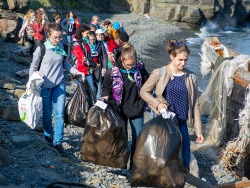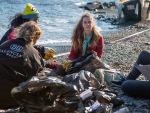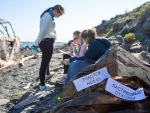Marine litter monitoring on the beaches of the Zhitkov Peninsula.

A few specialists of the Environmental Education Center of the Primorsky Aquarium along with senior pupils from the VSUES boarding school for gifted children have made a beach litter survey of the Zhitkov Peninsula. During the survey they collected about 50 kg of debris mainly consisting of foam polystyrene, plastics and bolt timber.
“The monitoring of marine litter was undertaken in the framework of an international project which has been running in Primorsky krai for 10 years. The project involves participants from China, Japan, South Korea and Russia”, says Inna Kaufman, Senior Specialist of the Environmental Education Center. “The pupils of the boarding school for gifted children have been participating in the project for 5 years, and we joined them last year.”
A beach litter survey is not a volunteer clean-up; during the survey all the collected debris is sorted out into eight categories according to its type and analyzed. The monitoring methodology also requires to identify the country from which the litter comes from. This year there has been a lot of debris brought by August and September typhoons from North Korea. Fishing buoys used by North Korean fishermen are made of foam polystyrene that is the most environmentally harmful litter since it can easily crumble into small pieces and get into the bodies of aquatic animals via food chains.
The beach litter monitoring program is mainly aimed at preteens and teenagers. When taking part in such projects, they learn how dangerous the garbage dumped in undesignated areas can be. “This is my fourth year participating in the marine litter monitoring”, says Aigiul Ovchinnikova, a 10 grade student at the boarding school for gifted children. “The analysis of the collected beach debris will help us to determine the wastes posing the most serious threat to the environment; thus, the production of these materials will be reduced. Every individual is able to keep Nature clean by disposing of garbage in the designated places. And it is within our power to decrease the amount of wastes we generate. For example, while shopping we can take reusable grocery bags instead of plastic ones.”
The monitoring results report will be submitted to the Northwest Pacific Region Environmental Cooperation Center (Japan) that publishes an annual brochure containing survey results.

